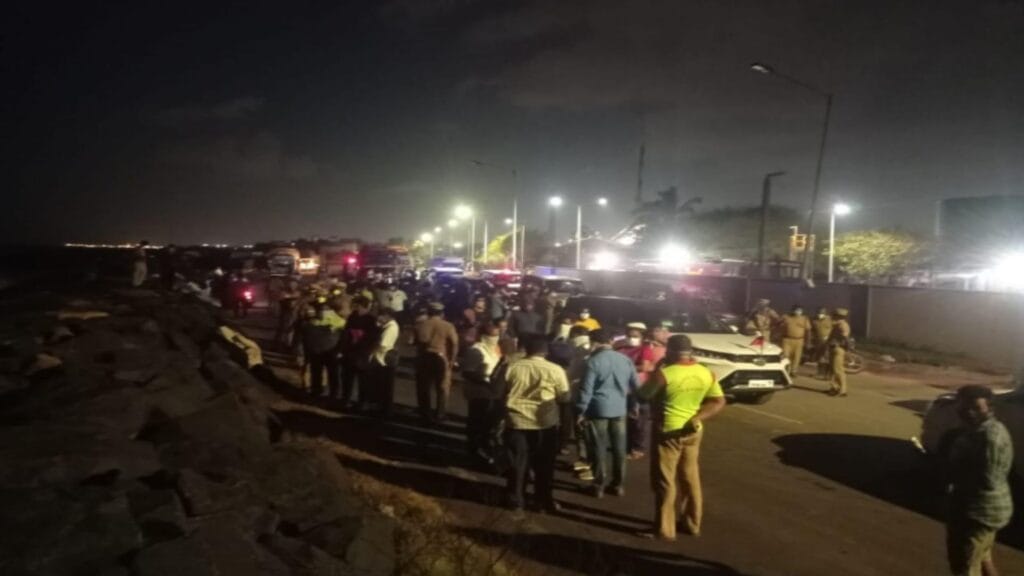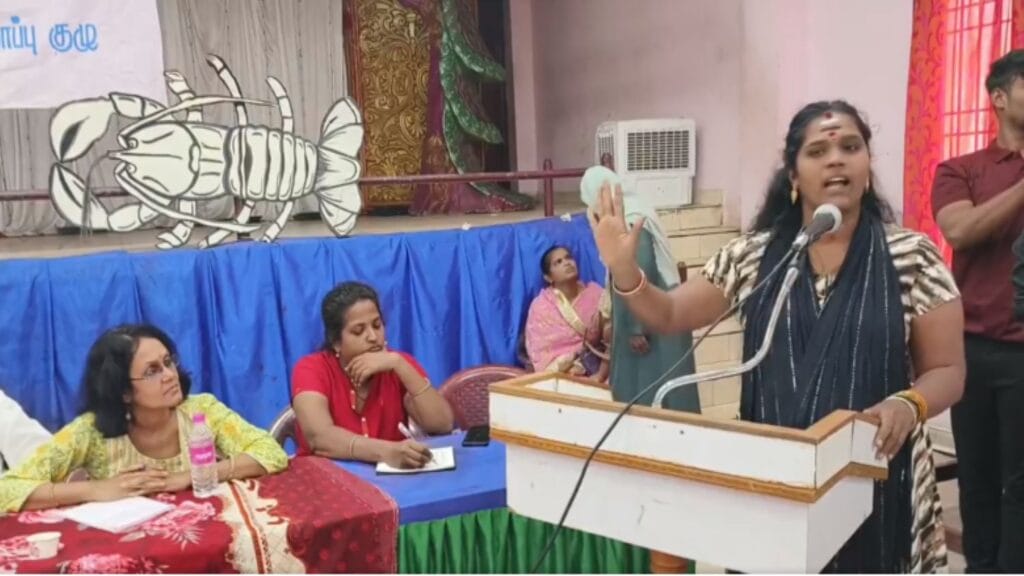For years, the residents of Ennore have grappled with the health and livelihood issues arising out of living in a toxic environment. The recent oil spill in the Manali area of Chennai, the ammonia gas leak on the night of December 26, 2023, and the events that followed have been nothing short of a nightmare.
At a recent public hearing organised on January 1 at the Ennore Vyabarigal Sangam Thirumana Mandapam by the Ennore Makkal Paathukaappu Kuzhu (Ennore People’s Protection Committee) — a campaign front bringing together representatives of all 32 villages/localities in the Ennore/Ernavur region — people living in these villages recounted how the extreme climate and hazardous environment have affected their families for decades, and the recent events have only added to their fear and trauma.
The public hearing panel headed by Justice (Retd) K. Kannan, Punjab & Haryana High Court has recommended that the government should notify Ennore backwaters as a special wetland, as directed by the National Green Tribunal’s July 2023 order. The panel, in its report released to the media, also recommended that criminal cases be filed against Chennai Petroleum Corporation Limited (CPCL) and Coromandel International Limited (CIL) for “reckless negligence leading to harm to human health and the environment.”
The panel report observes that the residents lament the lack of government action and the adverse reaction to the peaceful protests by villagers to draw attention to their suffering, wherein 18 residents were booked under various criminal charges for highlighting their problems during protests.
The other members of the public hearing panel included D Nagasaila, advocate, Madras High Court; Dr Kalpana Karunakaran, academic; Kavitha Muralidharan, journalist and Vaishnavi P, labour activist and journalist.
Read more: How industrialisation has rung the death knell for Ennore’s ecology
Recommendations for urgent action

Here are the other recommendations made by the panel to the government:
- Acknowledge the hurt and loss endured by the community by announcing an interim relief to affected persons. The money given to victims should be recovered from the company.
- Withdraw criminal cases against the 18 residents of Ennore.
- Close down CIL’s fertiliser plant and deny permission to the company to reopen, considering the risk of hazards to people living nearby.
- Conduct a comprehensive health check-up by an independent team of doctors. Those exposed to the ammonia gas leak should be examined to assess the short-term and long-term impact on their health and given treatment including counselling for trauma healing. The cost of the treatment should be borne by the polluter.
- Organise a comprehensive health survey in the region to examine the effects of large-scale environmental pollution on the communities living there.
- Publish the government’s inspection report on the gas leak immediately and make public the offsite emergency preparedness plan submitted by CPCL and CIL.
- Implement environmental laws and regulations. Regulatory bodies like Tamil Nadu Pollution Control Board (TNPCB) should check non-compliance by polluting industries and take necessary action.
- Declare Ennore backwaters as a special wetland and take steps to rejuvenate the area.
Toxic tour of the localities
According to the Ennore Makkal Paathukaappu Kuzhu, as part of the public hearing some of the members of the panel were taken on a ‘toxic tour’ of Ennore and north Chennai by K Saravanan and Nityanand Jayaraman of Save Ennore Creek Campaign. The panel members saw the erosion that had swallowed vast tracts of inhabited land in Thiruvottiyur-Ennore and how residential areas were close to the hazardous industries. Tenements to house 38,000 marginalised persons were dangerously close to the chimney stack of an under-construction coal-fired thermal power plant.
“We drove along the Ash Pipeline bridge and saw vast tracts of wetland that are buried under
coal ash. We also visited Seppakkam, a village whose hapless residents have been condemned to live in the shadow of a sprawling coal ash pond where decades of ash from NCTPS has been dumped,” the report said. The team also saw Coromandel’s fertiliser facility, and the screened-off section; the facility reportedly has a 12,500 MT ammonia storage tank and the surrounding areas are supposed to be densely populated.
Read more: Ennore backwaters an “environmental crime scene” as fly ash dumping and encroachment continue
Testimonials by hapless residents

Here are some testimonials of affected residents recorded during the hearing:
“The company says the gas leaked only for two minutes. But in two minutes if so much damage was
done, if it had leaked for 10 minutes, our village would have been destroyed.” — Kuppulakshmi,
Nettukuppam.
“It has been six days. Still nobody has come. They shame us saying we vomited because we
were drunk. Tell me sir, can a child be drunk? Children and adults are traumatised by the
incident and living in fear. But they have filed a case saying we tried to hit the staff. We can
barely breathe. How would we have the strength to attack people?” — Subathra, Periakuppam.
“Just imagine. It is midnight, and you are in deep sleep. You get up and run. You don’t know
where to run. We ran without a destination. That night was a black night. This leak happened
from a pipe that was under water. We could easily infer that much of the toxicity was absorbed
by water by the sight of the fish that died and washed up ashore. If the leak had happened over
dry land, we would have died like the fish.” — Shajitha from Kattukuppam.
“People have spoken about respiratory problems. But they have not said that women in Ennore
have difficulty in conceiving. They say that the embryo growth is compromised. I have been
married for four years. I have spent 3.5 lakhs to bear a child. After much difficulty, I now have a
child. On that night, I carried my 40-day child and ran from here to Minjur (15 km). To save this
child that I have borne with such difficulty, I say that we don’t need this company here. We want
a next generation. The company is not needed.” — Lalitha, VOC Nagar.
Note: This article is an abridged version of a Press Release from Ennore Makkal Paathukaappu Kuzhu (Ennore People’s Protection Committee).
Also read:
- Women of Ennore are living testimony to the many costs of pollution
- PM2.5 upto four times higher than safe limits in Chennai pockets; where’s the action plan?